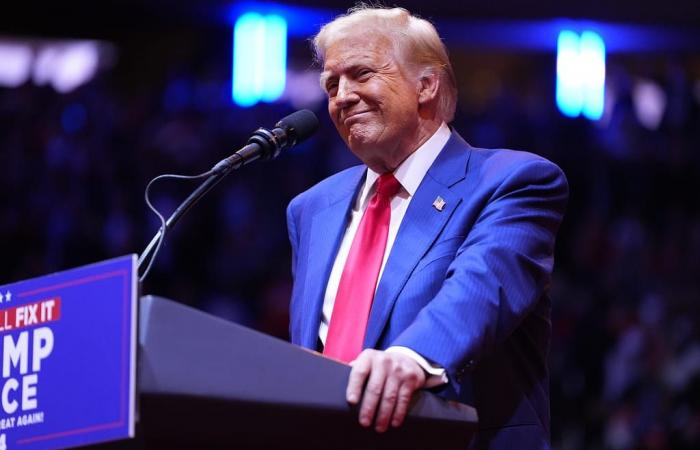Interview
November 12, 2024
Four years after his defeat against Joe Biden, Donald Trump will soon return to the White House. If the Republican’s victory against his rival, Kamala Harris, was perceived as possible, the scale of it surprised observers and raises questions about the transformation of the electorate in the United States. His re-election also brings uncertainty about the future of the country’s domestic and foreign policy. How to explain Donald Trump’s victory? What impact can it have on the different centers of conflict and on American foreign policy? What were the consequences of the general election on women’s rights in the United States? The analysis of Marie-Cécile Naves, research director at IRIS and director of the IRIS Gender and Geopolitics Observatory.
How to interpret the results of the US presidential election and the diversification of the Republican electorate?
It will take time to analyze and fully understand this election because the electoral sociology will take a long time to establish, especially since it differs according to the federated states. We can still say that Donald Trump is not expanding his electorate, but that he is diversifying it by winning Latino voters (or even female voters) and that he is attracting young men, particularly those without higher education qualifications. . Kamala Harris obtains a majority of female voters and qualified people, but has several million votes less than Joe Biden in 2020. If several explanatory variables are already emerging, we cannot reduce them to one single parameter (the economy, inflation, immigration, etc.). These elements played a role, of course, but are not enough to explain this result. The situation is all the more complex because the issue is not only national. All over the world, “strong men”, with a penchant for political and verbal brutality, nostalgia for a fantasized past, the promise of unbridled capitalism and the need for revenge, win elections or aspire to power.
Kamala Harris’s field campaign was impressive, limited the damage in key states, but did not succeed in aggregating all the progressive forces that Joe Biden had built in 2020. Ecology was absent. Engaging in distant wars is outdated, unpopular software. The unconditional support for Israel and the massacres in Gaza have undoubtedly lost votes in Michigan. In the United States as elsewhere, the political leaders in place during Covid-19 have also paid dearly the price of this pandemic, this global trauma with probably underestimated psychological effects. Joe Biden and Kamala Harris, despite stimulus plans and falling unemployment, have not been able to shake off persistent unpopularity.
But it’s not just about that. The fear of the decline of the country, the difficulty in projecting oneself, the real or imaginary dangers: everything was orthogonal to the story told by Kamala Harris, that of abstract optimism. No doubt it is also unthinkable, for part of America, to elect a woman. Another element is that in 2020 Trump was the incumbent, while in 2024 he was theoutsider. He was seen as outside the system even though he was immersed in it. “Make America Great Again” thrives on the terrain of apocalypse and its project oscillates, not without contradictions, between limitless freedoms (of speech, of business) and authoritarianism (on the movement of people, access to health , the right to dispose of one’s body, etc.). Verbal abuse and elbowing become a sign of respectability. Insulting and meanness are the norm. Social bonds, responsibility, attention to others are marks of weakness, signs of ineffectiveness, in a society perceived as increasingly threatening, and in a world itself seen as hostile towards -vis the United States. The line between reality and entertainment is blurring. The buzz and clash business model of social networks, and media coverage fascinated by Trump, provide a formidable echo chamber for massive disinformation campaigns (which the Democrats underestimated or failed to grasp).
What will be the consequences of the election of Donald Trump on US foreign policy?
On a global scale, the United States will exercise its power differently under Donald Trump: it will no longer want to be a model of multilateralism, but to appear as a superpower that scares and adopts a transactional foreign policy. And this, while the place of the United States is increasingly contested (BRICS+, etc.). A change compared to 2016: the big bosses who financed Donald Trump’s campaign will take positions in the administration. Will there be Space X leaders at the Pentagon? Billionaires like Scott Bessent (hedge fund boss) at the Treasury Department (which plays a role in imposing sanctions against Russia)?
We must be clear: the promise to disengage the American military or American military support in several regions of the world is not synonymous with world peace. In Europe, the fate of Ukraine is very uncertain. For Donald Trump, NATO is not a body of solidarity in the face of conflicts but an organization which allows its members to benefit from American protection at a lower cost. JD Vance is already threatening Europeans with disengagement from NATO if they decide to regulate X or overtax Tesla cars.
Will Europe be able to agree on military and commercial plans? Nothing is less certain. On the one hand, Donald Trump has allies in Europe, on the other hand, there is no European foreign policy, no European defense, or even an armaments Europe. Donald Trump’s first term is a failed precedent for European unity.
In terms of trade, will we be united if Donald Trump decides to overtax German cars? How will we respond to tariffs of 10 to 20%? We have not managed to agree in the face of Joe Biden’s protectionism, what will happen tomorrow?
And how can we influence the strategic competition between the United States and China? China will consider Europe as a fallback market if the United States overtaxes Chinese products, and it will not only redirect its exports. It could also reduce its imports. The European trade deficit could therefore worsen with Beijing. And Donald Trump will ask Europeans to condemn Chinese overproduction policies (“give and take”).
What will be the impact of these general elections on women’s rights in the United States?
The fact that Kamala Harris focused on the right to abortion limited the damage in her campaign, and the referendums on the subject overwhelmingly confirmed this right at the local level. The consequences of a Trump II presidency will be catastrophic for women because the Trump ecosystem is in a dynamic of revenge on #MeToo and the Women’s Marches and because it is not only a question, through anti-feminism, of reversing the achievements in terms of equality, but of promoting a profoundly misogynistic policy. JD Vance, the future vice president, believes that women who do not have children are useless, and that they should be taxed more. In MAGA software, the right to abortion conditions women’s autonomy: it must therefore be removed. We can expect restrictive federal laws in this area or the dismantling of the Comstock Act, from the 19th century, which would amount to banning abortion at the national level. Medically assisted reproduction (MAP) and contraception are also threatened, and the health crisis caused by the Dobbs ruling of the Supreme Court in 2022 will only get worse. The fight against discrimination, against gender studies at university, the persecution of feminists: we can expect anything.






